Number27



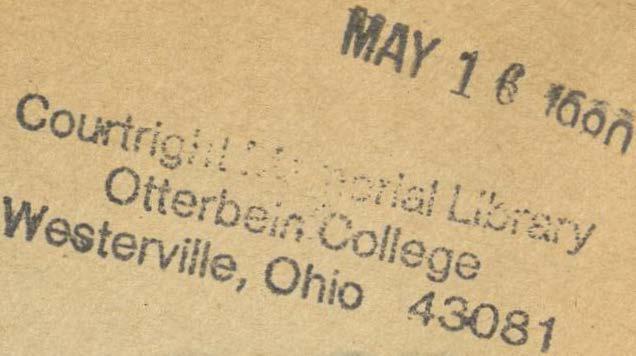

Student Newspaper of Otterbein College. May 1 6, 1980
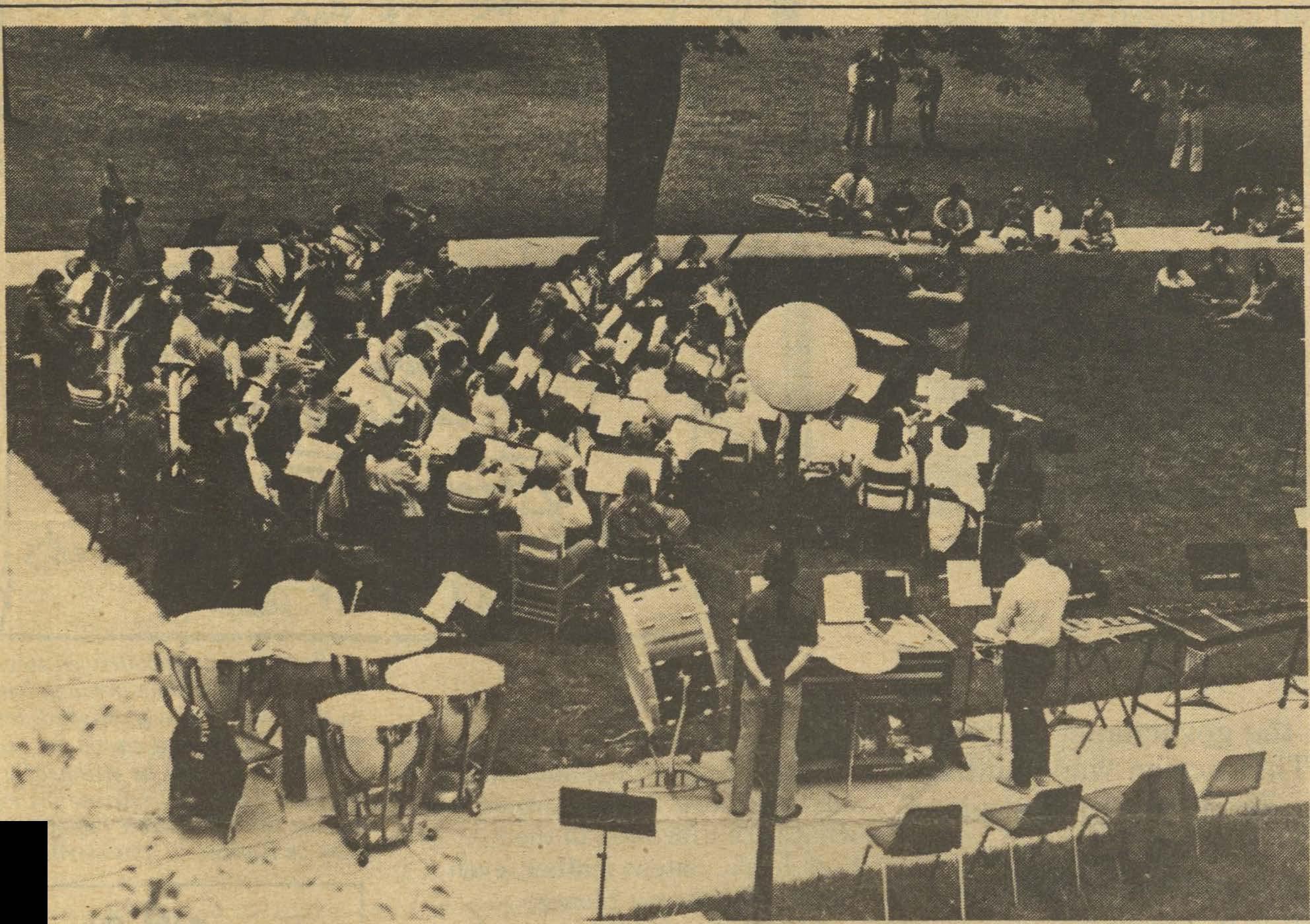

Number27





Student Newspaper of Otterbein College. May 1 6, 1980

By Lois McCullen
"It seems to be a trend among all private institutions this year," says Morris F. Briggs, director of admissions, accounting for statistics which indicate about 75 fewer freshmen accepted for academic year 1980-81. "We do compare our figures to other colleges and it seems the cost this year has had a serious effect on most schools," Briggs says. "The current economic rates are just not helping the small, private college."
According to Briggs, this is j_ust one of the factors which accounts for the lower admissions standings this year. Different program needs and McDonaldPhoto the quality of students enrolled in them is a contributing factor,
By Becky Scheck
The College Senate passed a bill Wednesday which reduces Otterbein's physical education requirement to three terms or one year. This new policy will be in effect for June 1981 graduates.
The rationale of this bilJ is that it will increase siheduling flexibility by making each activity worth one-sixth of a unit of credit. Thus the requirement may be fulfilled anytime during a student's college career.
Male varsity athletes will no longer be excused from the phys. ed requirement, bringing Otterbein into line with Title IX. This change also allows students to take up to three terms of phys. ed. as elective credit.
The Senate passed and sent on to the Board of Trustees a bill which would allow Otterbein to award a bachelor of science degree, as an alternative to the bachelor of arts program, in several majors. The College's action must be approved by the Ohio Board of

Regents before it is effective. Under the terms of this bill, by completing a major, the LS. pattern, Math 17 and 18 and foreign language competency equivalent to successful completion of a 12 level language course, a student
as well as incompleted
s a IS e applications.
would be able to earn a bachelor of science degree in psychology, dietetics, accounting, business administration, computer science or any major in the Math and Science Division. See "Senate" on Page 3
All students who plan to live in residence halls next fall should participate in the room selection process next week. Students who will be seniors next fall will select their rooms Tuesday from 7:30-8 p.m. in the main lounge of the Campus Center. Those who will be juniors will choose rooms from 8-9 p.m. that same night, while next fall's sophomores will select rooms Thursday from 7:30-10 p.m.
�tudents (seniors excluded) who hope to live off campus should also select rooms, as students will be allowed to live off campus only if the dormitories are filled.
Students must pay the registration fee of $100 before they will be allowed to select.
They must also turn in their signed room and board contracts that night.
Any student who has bills owed to the (library fines, parking etc.) must make sure that has a balance of $100 in account. Any such fines will be paid out of the registration fee and his will be less than the required for room
Any male student who wishes to view the facilities of Mayne Hall before selecting a room should attend the open house in that dormitory today from 3-5 p.m. Female students who wish to view Hanby Hall should attend the open house in that dorm, also scheduled for 3-5 p.m. today.
Sixty-two percent of this year's applicants are accepted and only 34 percent of those incoming freshmen are paid. Briggs says that many times students wait to complete their folders until later because they are contemplating Otterbein 's cost and other schools to which they hav-e applied.
"This is especially true of men," says Briggs, "and though they are slower in finalizing their folders, they usually outnumber the women by September and certainly by the end of the year." Seventy-five percent of the applicants at this time are women.
"Closer to September, we will do a survey to determine just what factors are in the minds of those students who do drop from the admissions count." says Briggs, and he anticipates that nearly 60 percent will drop.
"We do set an upper limit for each class." says Briggs. "but we don't need to use it unless our paid applicants come close to the figure. at which time we put students on a waiting list."
Otterbein College will soon celebrate the 10th anniversary of the present governance system. It was on June 6, 1970, that the Board of Trustees approved a proposal to allow three students and three faculty members to join the board with full voting power and to establish a unicameral legislative body (the College Senate) composed of an equal number of students and faculty members and a smaller number of administrators.
The governance system was the first of its kind in the nation. Even the New York Times printed articles about the small college in Ohio with the new, radically different governance system.
At the time students felt that this system would give them a greater voice in the government of the College and that it would change and grow as the students changed.
In the Sept. 18, 1970, issue of the T&C, the president of the lame-duck Student Senate was quoted as saying, "We shouldn't be stagnant with it (the governance plan). We should let is grow and mature with the life and destiny of the college."
But has the system "grown" and "matured"?
In 1970, 63 percent of the student body voted in the campus elections. Last month less than one-third of the students voted.
Where was the students' voice in the governance system when Zeta's charter was revoked? That action was handled solely by the administration with no input from the student VOICe.
Are these indications that the system has "grown" and "matured" or are they indications that it has become "stagnant"?
Perhaps, on this 10th anniversary of our governance system, the entire College community needs to examine the system's performance during the past decade and its possibilities for the future.
Is the system capable of functioning with a great student • voice and is it capable of "growing" and "maturing"?
If not, perhaps the system needs to be revised so that it accomplishes these goals.
By Eric Costine
Security cops at Otterbein's campus have a very important job. Almost as important as - those students who feed the lab mice at the Science Building. It is not a pretty job that our specialized cops do. They are not glorified for their jobs. They rarely get any respect from students around the campus. Students have a habit of hounding the cops whenever they have a chance.
Well, a few changes are being made in the security system to insure good coverage of all students.
Recently we have seen the use of old, beat-up cars used for security purposes instead of the usual Plymouths that are
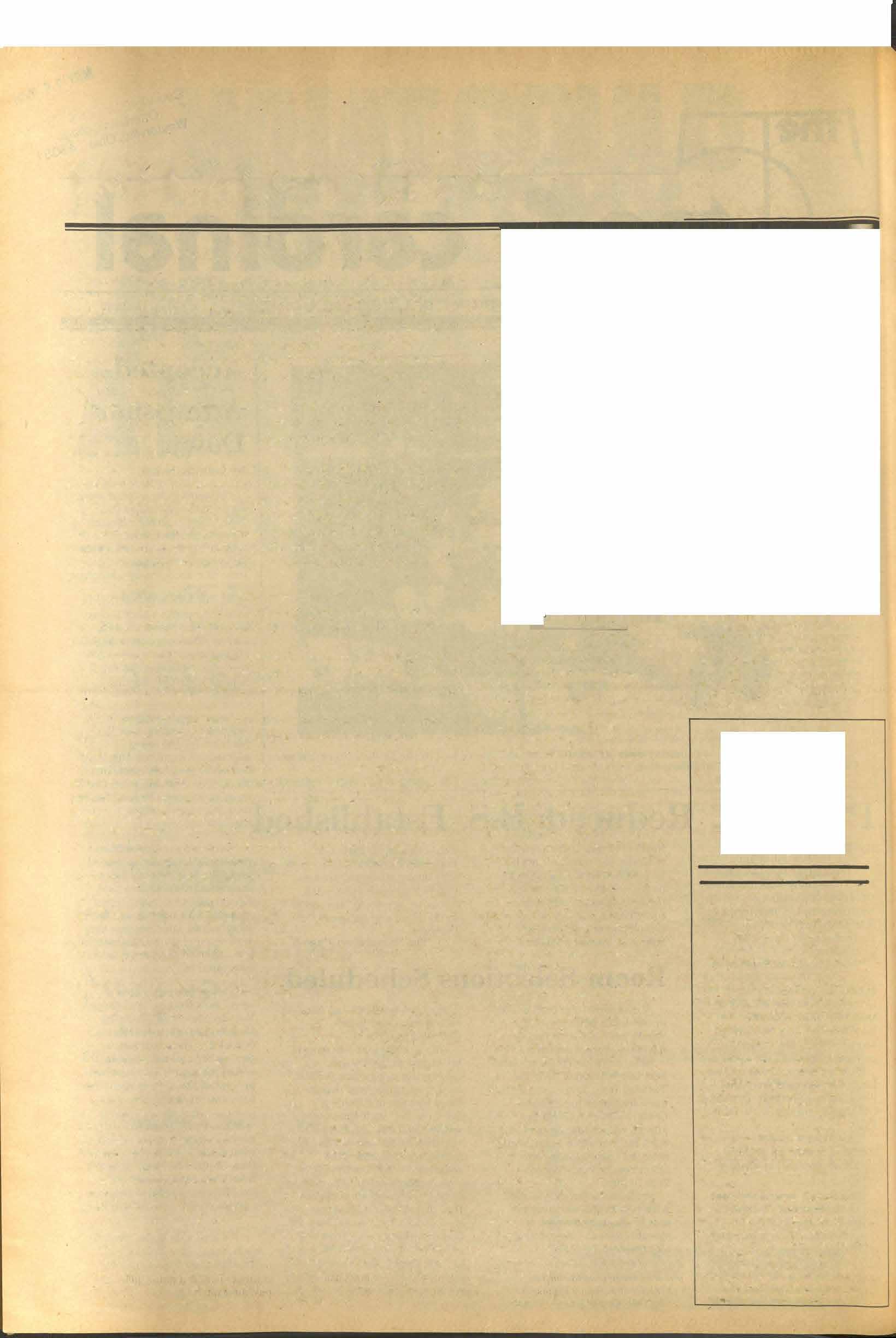
driven. Reason? First, the old cars add a bit of flavor to the job. Those old Plymouths were a dirty white color that was terribly unfashionable. The beat-up car now used is a putrid color of green; but it really gets your attention.
The second reason for using a different car is that every student on campus had the Plymouth memorized. They knew the shape, the color, the tires from hundreds of yards a\vay. They knev,· the sound of the engine so -a cop could not even sneak up on them. Now with the newer cars, a cop has a chance. In today's society cops never get a chance. At least Otterbein takes this into consideration.
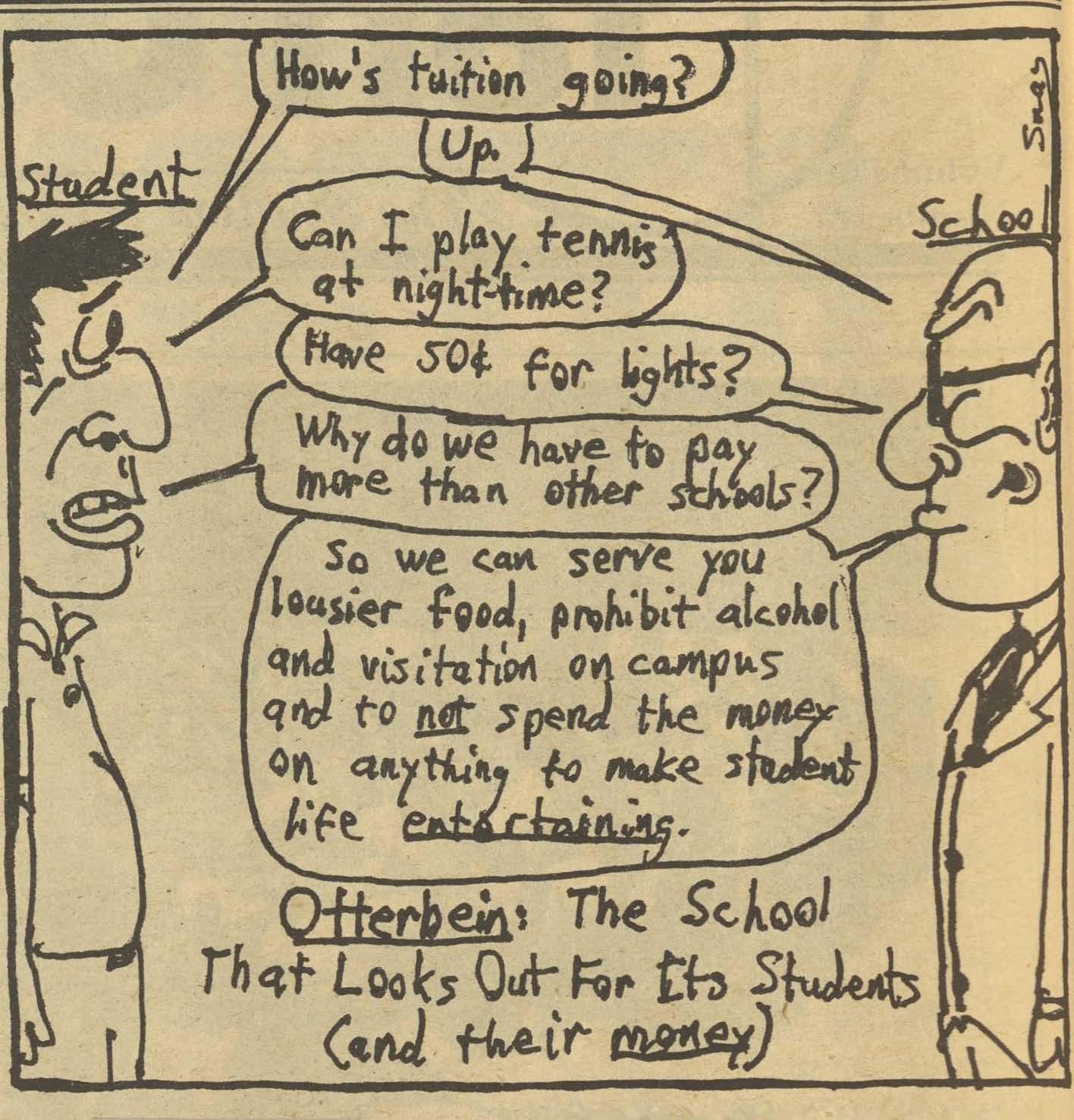
Another change is dress. The security cops are no longer required to wear the standard uniform. Now they can wear what is comfortable to themhigh heels, pate�t leather, even casual slacks or a blouse.
The reason for this is much like the above. Students could spot those uniforms a mile away. How are rules to be enforced if a student illegally walking through the grass instead of on the sidewalk can see a cop who is sneaking up to bust him? So now the cops can dress incognito.
Not a week after this new policy was instated a bust was made of a girl coming out of a fraternity house at12:1.5 a.m.after hours. This is the firsi bust of its kind since 1923 so we know that this new system is the right move.
How did the cop dress? I'm sure you are dying to know. He was dressed in old blue jeans and a t-shirt and he was wearing a leather hat like the hippies used to wear back in the '60's. The girl had no idea who he was; but boy, he knew who she was.
The security staff is also being enlarged. Al-exandr Tobetzen (age 72),was hired on the seventh of May, 1980. Don't let his age mislead you-he is highly qualified for the job. Alexandr was born in the Ukraine in 1908 of peasant parents. He was nine years old when the Bolshevik revolution occured in his country. At the age of 24 he started working for Joseph Stalin as his private body guard.
See "Alexandr" on pa ge 7
Readers are encouraged to express
views and opinions through letters to the T&C. To be published, letters must be typed and carry the author's name. Name will be withheld upon request. The T&C retains the right to edit all letters and requests that they be limited to 250 words.
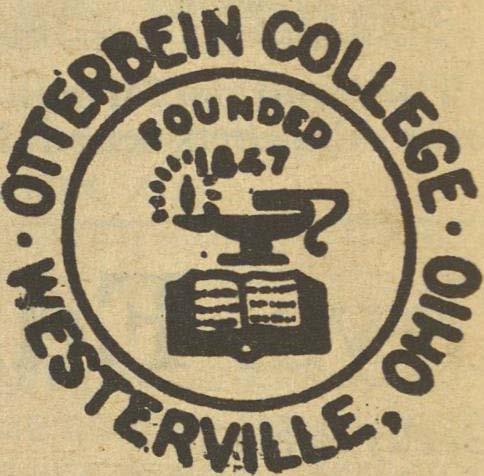
Published at Otterbein College Westerville, Ohio43081 Second ClassPostage Subscriptionrate $7per year
Editor -In-Chief, Scott Brockett Managin g Editor, Becky Scheck Photography Editor, Tim O'Flynn Business Manager, Sue Shipe Advisor, Jennifer Goins
Contributors: Jeff Boehm, Dave Callahan, Nancy Casebere, Scott Clark, Eric Costine, Christine Cover, Denise Dankhoff, Rob Engelbach, Chris Ferguson, John Hulkenberg, Lynn Kirch, Lois McCullen, Janette McDonald, Tim McMasters, Craig Merz, Cathy O'Neill, Cindy Prochaska, Desiree Shannon, Steve Spangler, Fred Swan, Natalie Wymer, Dave Yaussy.
Opinions e:cpressed herein are those of the staff and do not necessarily reflect the Piews of the school or of its administration, Published e!'ery Friday during the school year, holidays excepted. Offices in the basement of the Campus Center. Mailing address: The Tan and Cardinal, Otterbein College, Westerville, Ohio 43081. ·
In the seconcl part of a threepart series e.rplori11g nuclear energy, ju11ior Toby Uchtma11 i11terl'ie1ced Robert Place, associate professor of chemistry at Otterbein. Place speculates on the possibilities of a nuclear disaster and the future and desirabihty of nuc-lear pou·er.
Q: The waste is obviously a problem with nuclear reactors. Could you elaborate on what needs to be done to solve the problem?
A: I thi11k the 11·a,-de proble111 is drw;ticul/!f 01·e1played .o More rrulintio11 co111e.-; i11to tlu at11ws1>hr>re fro111 coul thaII from 1111l'lear reactors. Tlwf'g bec,uu-w ofotrnt<' a1110111ds <l mdioactire 111ateriuls i11 the ('()OI ll'hic-h are released ll'lte11 coal is bul'lled. Pl11to11i11111 /l(rn a ltalf-lffe. This 111ea11s that at -;0111e point it ll'ill be al1110.-;t gone through 11aturnl decuy. Ho1cei-er. arse11ic itm't radioacti1•e. This 111ea11s arse11ic is there forerer .o I dono'o t think there is as serious a nudear u·aste prohle111 as ice are co11ditio11ed to belie1·e.
Q: What are the chances of a nuclear accident occuring of such magnitude as to wipe out a large land mass'?
A: With 111a11JI 111ore reactors i11 O/H!l'<ltio11. the chcrnces ure that a major accide11t 1ro11lcl Ol'('/11' 011ce i11 sereml l11wdred yecu-s. rt" a1111thi11u. Three ]\,file lslc1111l pro1·ed the (·011serrnti1'<' 11at11re <d the safety-risk calc-ulatio11s. The sequence of ere11ts that happened at Three Jiile Isla11d should ha1·e caused a melt-do ll'II, a( ('ording to the ass11111ptio11s behind the theoretical 111odds;. Ho/l'et•ff. 11·e as a society are fi.mted hy the ,·atw;fl'ophe. a II(/ we take the 11·orst possible case <d a J><t rt i('ti/a I' 1·01u·c11f nited 111eltrloH·11 e.,·plodiII[} i 11to the e11ri1·011111e1d m1iidly. The11 .·tro11u ll'i11d.<; earl'!/ the rrulionctirit!I lo11!J distailce.-;.
Z/' (I 1111dea/' /"('(lefOI' blell' ll}J, it 1ro1ilcl 11 't bloll' 11}) a <; a /)()/Jib bern11se the 11n111i11111 atom.<; are 11ot £'lose e11011uh toyether to for111 the £'ritfral 111as.-; /leeded for <111 atomic e.rp/o.-;ion, as in the bo111b dropped 011 Hiroshima.
I might add that radioactire proce.<;se.<; nwst be operated safely. E.rposure to the radioactit•e rnaterial should be minimized because there is no question that radiation abo1•e certain Ierels can produce many undesirable diseases or side effecfa.
What we hm•e been functioning in for a long time is a risk-a l'Oida nee rne 11tality. If there is a l'isk we u•ant to ai•oid it completely. Possible cancel' chemicals are immediately banned aen if the risk is only slight. We fen"! to see the risks of making alternate choices.
For e.rample, cycla111ates 1cere banned for some time e1·e11 thouuh the cane-el' l'isk fol' a pe1·so11 dl'inki11q 111a11u bottles ri cliet pop eac-/1 dau is Jin· less than the ehaw-e <du disease bei11y l'<lllsPfl bu a11 <>i'enceiyht pel'so11 's (·011s11111J>ti1m <d too 11iuch 11at11rnl :w(JCII'. ft is somethi11y 11·e ca11 only 111i,1i111i::e-11ot al'Oirl. Instead <d l'isk arnidall(·e. 11·e 11111st estimate the total !'isl; of ra!'io11s sol11tio11s related to ew·h other. To 111e, the risk <d Oil/' eCOII0/11// bei11u e1ula11qaecl by cupl'itious deei.-;io11.<; in the Middle East i.-; fa I' gl'eatel' tha II the mdioacti1·it!I risk fl'om 111u·lear ' poll'er plants.
1f 11011 w·c11111ulnte the da111aye do11e hy the polluta1ttsofro111 coal. partic11!arly. b11t also oil, d ,11011 i11d1 1rle 111i11i11q ac·eide11ts, if !JOii i11cl11de accide11ts i11 tl'a11sJ)orti11u larye rol11111es <l oil or <·oaf. the11 the ucnw1ulated ri.o;ko fro111 fo.-;sil fuels is yreater tha11o that fro/}/ 1111clear fuel.o
Q: Do you feel that nuclear energy is a viable alternative to fossil fuels? Is it the fuel of the future or is it a stepping stone to something better?
A: I th i 11k 1111c-lear fis o;io11 11.-;i11q 11ra11iu111 or pl1du11i11111 f11el all(/ the 11se of the fossil f11rls (c-oal, gos. oil) are all .-;teppi11g sto/lcs to :-;olar J>o11'el' all(/ f11sio11 powc1·. Fusion JJOll'<'I' J)romi.-;es a11 111ilimitedof11el SHJJJ>ly .-;i11ce /l' (lter is the f11el. Solar po11·er is ol.-;o 1111li111ited. nltho11yh colledi11u it 11re.o;e11t.-; c1 l't((i11 JJl'ohle111.-;. I thi11k ice 111,,·<f to he 11wt1u·e ((II(/ O<"n'J)t the fact flt((t II 11rf,,u I' JJOll'('/' i.-; (l It('('(',<;.<;(//'// 1'11£'1'/l!J .-;o/l!'(·e tu (/f'f 11,-; tit n!/tfjlt to tlte 1·n·1d1l<II lo11y<'I'. n'11e11·uhle ,·1'so11l'cc.-; ,d the f11t II re.
The f11t11l'e ll'ill 1rit111•ss r1 l>/e11d <l energy re.o;o1u·c·es. ew·lt <d ll'hi<-h has risl,·s. prohlem.-; u11<1 ad/'(1/zfayes. lVe ll'ill 11rnke .-;ome uoocl clecisim1.-; a11d so111e hacl deci.-;io11s, but 11·,, ll'il! 11111drlle through. I cw1 11ot a 11ucleal' po1Cer acfrocate. b11t as a .<;cientific realist I do ,wt see how ice can a1·oid 1111c-lear J>Oll'er at a sig11zfica11t le1·el 01·er the 11e.rt .50 years a:, ice bridge the gap to new tupes of energy systemi
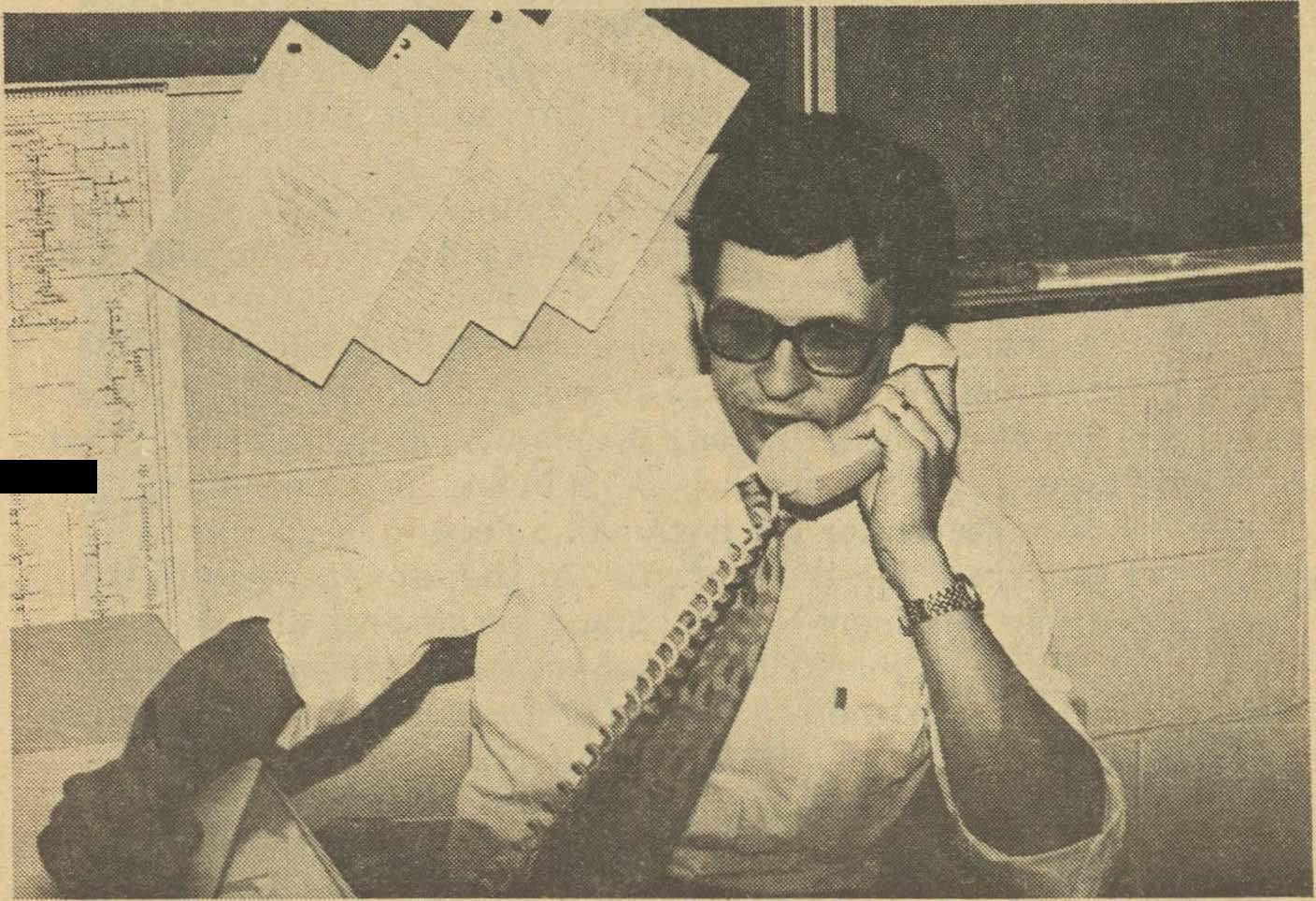
Dr. Robert Place says he is not "a nuclear power advocate." Bueh111 Pl,utu
By Dave Yaussy
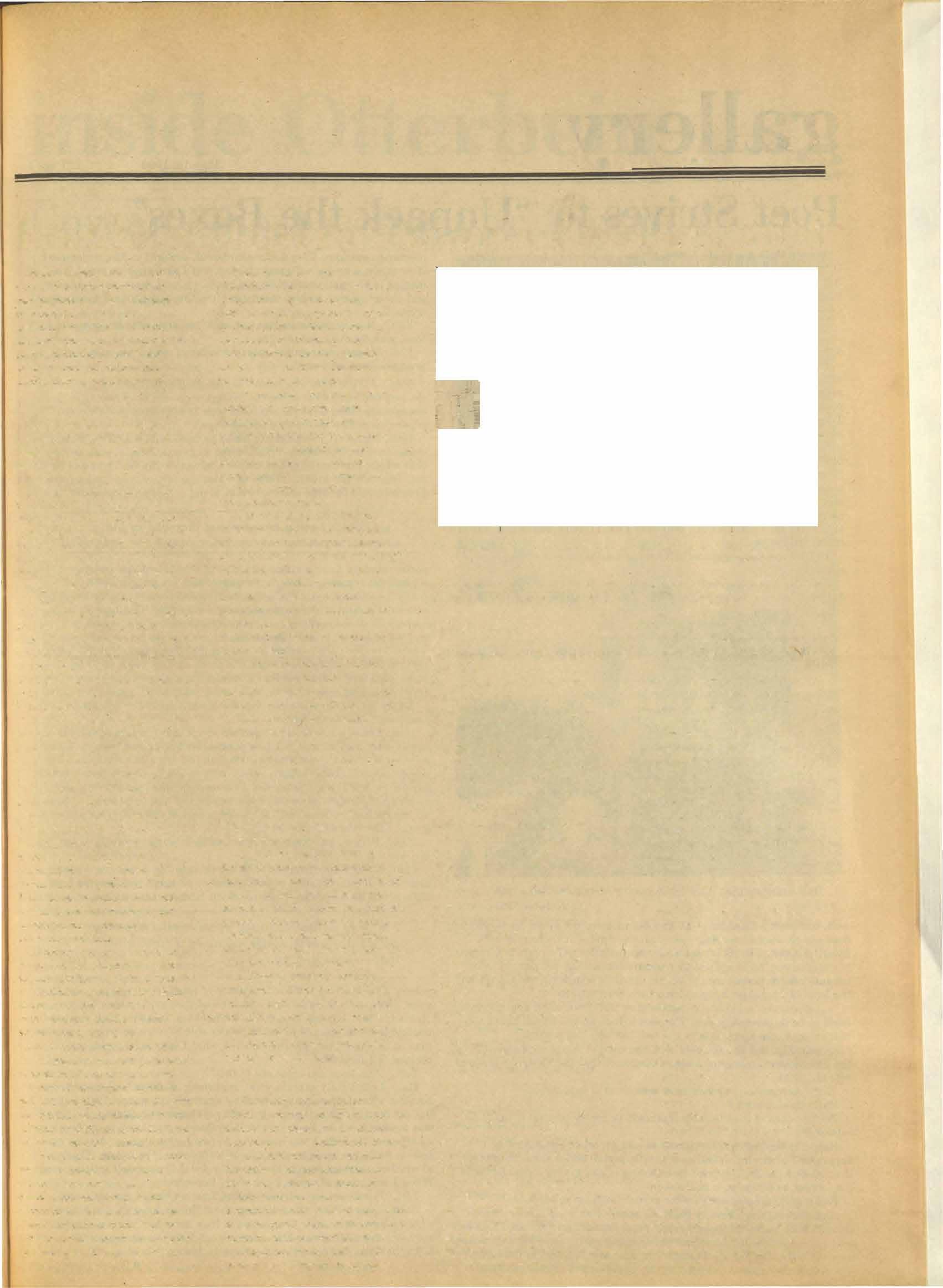
birth pangs·. I am in travail.
Suddenly it shoots forth, a biological Old Faithful. Why Hello. How are you? I am fine did I do such a thing? Was I also. Good it is to have you here. sickened by man's inhumanity My name is Swami Yow Sumi, to man? No, it was stale and I am mystic. Good it is to have you here. I am a simple peanuts. I can see the truth man trying to find the True laying plainly in front of me. I dream. In this dream I am Path. I live on handouts, free will offerings, and $300,000 a at one with the Maker, the Allyear from "spice" importation, Knowing Being. H€ teaches me if you catch my drift. But this everything. I know Love. I know now I give you the wisdom of Beauty. I know where my roommate keeps the Instamatic my insight. photos of his undraped Reflec tions of a Good Time girlfriend. He has given me so I am lying here in bed. I am much. and I have given Him at peace. I am happy. I am nothing. He will not take capable of anything. I am MasterCharge. drunk.
Angels carr y me back. I Suddenly the room becomes a wake up. The angels have swirling matrix. I am being deposited me on the floor. With· sucked into the whirlpool of the peanuts. At lea-st I have my Infinity. My being is lost in the hair. I need water. I need to cosmic somersaults of my mind. release fluid. Why this seeming Is this The End. or is it bed contradiction'? It is hard to spins? I put my foot on the think with my bladder pushing ground. Or is it the ceiling? The against my throat. I go to spinning stops. But I still do not relieve myself. know what a matrix is.
I am in the restroom. My I give birth orally to a mass need is great. But so is my of substance I have never seen desire to be free of stupid rules before. At least not recently. My and norms. I am tough. I am stomach heaves with terrible manly. I will do as I wish. I pee in the sink. But I am courteous. After I am through, I pull out
Continued from page 1
the stopper.
I go to a water fountain and Letween pursuing a bachelor of rinse the cotton out of my science degree and a bachelor of mouth. I think. "It is not dawn arts degree. yet, but there are many things I The Senate also passed and must do this day. Already I feel sent on to the Board of Trustees my sphincter telling me it is some recommendations from the fighting a losing battle in the Campus Services and end. People are yelling whispers Regulations Committee .tt me. But I don't care. I am concerning the Alcohol Task content. This is a small price to Force Subcommittee. pay for Fun.''
Donald Hall, one of the foremost poets in America today, came to Otterbein's campus last week to give a poetry reading as part of the Artist Series.Hall stayed the day after his reading to address two English classes.The T&C took this opportunity to ask him a few questions concerning his art.
T&C: Duringyourperformance Wednesdayni,ghtyou saidthatpoetry inAmerica is in a healthy state. What is itaboutAmerica thatmakesit a good environment forpoets?
Hall: I don't know, but there has been a tremendous increase in the interest in poetry among Americans.You see it mostly in colleges, but not only there.There is a belief among people who aren't close to it that poetry is a dying art.But the increase in audiences is tremendous. There seems to be a search for the personal, a need to look into the possibilities of the irrational, the fantastic.At the same time, with the undergraduate becoming more illiterate, and because we all are becoming more illiterate, there's a counter-movement towards a greater interest in language.Also, there's something about a nation in a volatile state that seems to have a relationship to the production of art, especially poetic art. Elizabethan England is a good example. We certainly live in a volatile world and America seems to be in the center of the ferment.I can not say why this should contribute to poetry, but I think perhaps it does.
T&C: Does a poet haveany social responsibility toa nation ortohis reader?
Hall: He has a responsibility to language.It was said that the poet's duty is to purify the language of the tribe. It's true of prose writers as
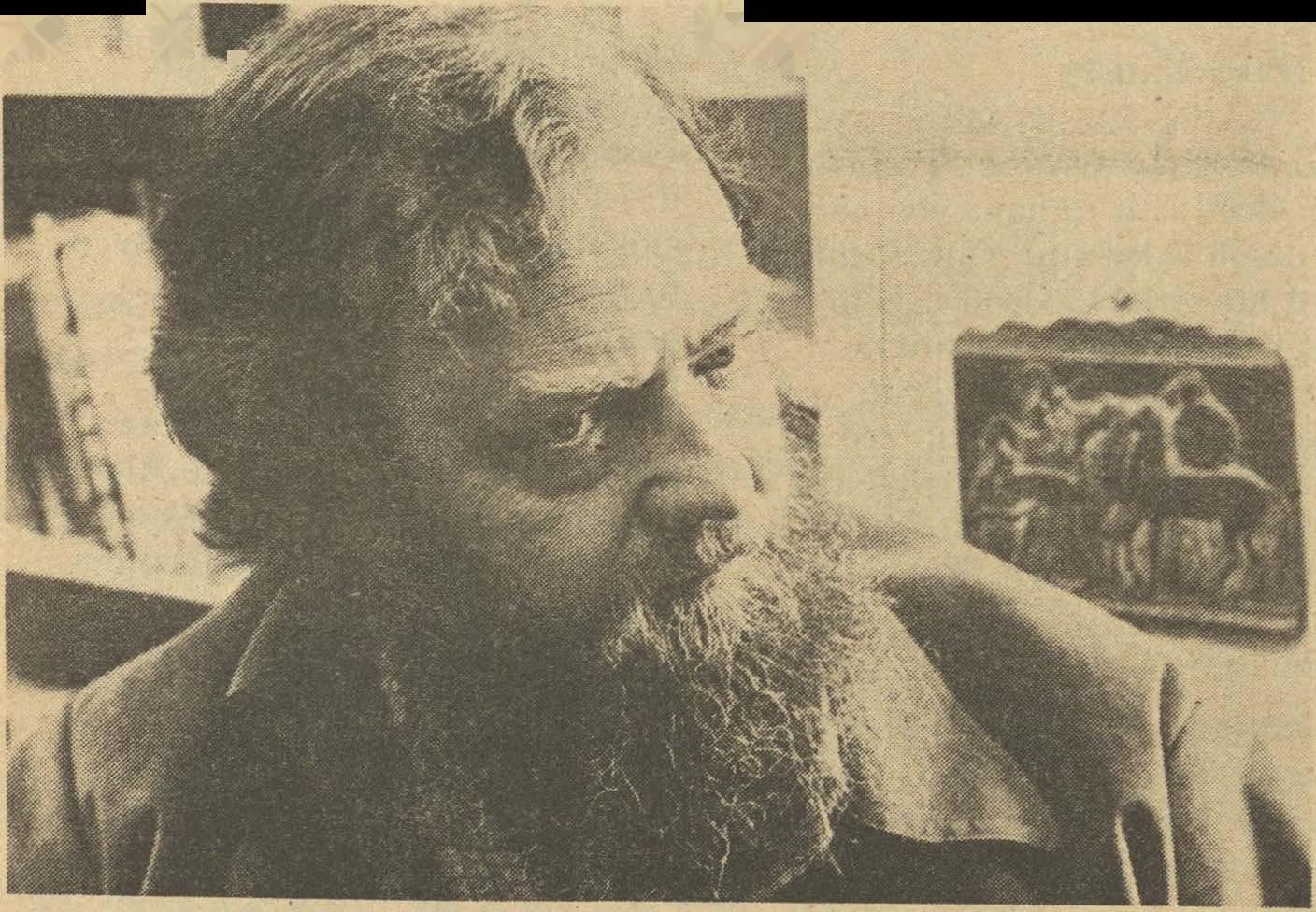
Hall believes that American poetry is in a healthy state.
McCullenPhoto
well, but poetry is -language at its most intense.We know the population does not sit around reading poetry all the time, but there may be a filtering effect.I think it's a social responsibility to be open to a variety of experiences, to be open to the negative as well as the postive.Also, because poetry makes use of the irrational, it frequently brings up into the light of language things which have been hidden. Whatever is hidden, suppressed or put down often misrepresents itself in behavior and action.The poet brings things which have been hidden up to the light.This is a social function and a social responsibility, not unconnected with the correct use of language.It's by the imaginative, resourseful use of language that the hidden is brought into the light.
T&C: Are you sayingthatwhen something is suppressed
Hall: Denied even-
T&C: -thenit isultimatelyexpressed inpoetry becauseit has tobe released?
Hall: I'm saying that commonly in society, when something is suppressed or denied, it works a terrific power under something other than its own name.The poet, by exposing it and giving a real name to the feeling, is diffusing a bad power.
T&C: What do youmeanbythe phrase "unpackingthe boxes?"
Hall: I'm coming literally from the scene of an attic house, where things of the past-a baseball glove, report cards from school, children's books you've read, letters from friends many years ago-will be packed away in boxes.In looking through the attic and unpacking the boxes you revisit the sources of your life, the beginning of things, and the
memories quicken.They are remembered, brought to life, understood. Now this is a process of remembering, but I also mean to make it a metaphor of remembering.In our heads we have many packed boxes and the process of writing poetry is often the unpacking of these mental boxes.
T&C: During your readings last night you seemed to beconcerned with time, with theflowand the ebb�
Hall: Do you mean in the subject matter of my poems or in the process of my readings?
T&C: I think both. The subjectmatter dealt with time and itsflow, but the way youread themseemedtocapturethat-drift-oftime. Are you consciously doing this?Do youthinktime is somethingyou want to explore as adimension, as a phenomenon?
Hall: I guess it just seems to me to be inevitable that time is the water in which we swim.I don't make a conscious desicion to swim in that water, but that's the only water I have to swim in.Time and its ebb and flow and the brevity of life, and also the connections backward in time to an earlier life, are important to me ...It's also true that in a
" ... there's been a tremendous increase in the interest in poetry amongAmericans." -D.
Hall
poetry reading I'm conscfous of a type of rhythm, of ups and downs.It's a performance and, although it's improvised, it's improvised out of many possible options.While I'm reading one poem I may be thinking of what I'll read next in order to control that time, that hour or hourand-a-half of the reading, and make something out of it which is shapely.It's a matter of interaction.I have a sense for an audience, where I might take them next, how I might move and continue to keep their attention.Sometimes I can feel them getting away and I know I have to go to a certain poem, either because of the subject matter or the type of reading or a combination of both, which will bring them back.
T&C: Inwhatwayareyounot similar to anactororanyother performer, like acomedian?
Hall: I have a much more variable script than an actor does.I'm much more like a comedian or a monologist who would have in his head all sorts of jokes or routines and who can feel the audience he has and decide what to do next.Up on the platform I've become a performer of my own work.I'm not just there as somebody who sat at a desk and wrote them.I want to be there as a performer and entertainer.I hope to do justice to my poems and I hope my poems are worth doing justice to. I can't know that-I c�n just try.
T&C: Why do you think youwere unable to write poetry fora few years?
Hall: I was very disturbed with my private life.I was particularly anxious and panicky.Out of that anxiety and panic would come brief little blurts of language-some of which later became poems, or parts of
"Ihope to dojustice to my poems and Ihope my po.ems are worth doingjustice to. Ican't know that-Icanjust try."
-D. Hall
. poems, later on.But I lacked the peace of mind to ruminate, to let them grow and attach to each other, the kind of slow work which for me characterizes the work on a poem.I would try to begin work on it and become anxious, disturbed really.I was able to work on prose.I wrote a play at this time, but poetry, which is what I take most seriously, seemed self-forbidden.
T&C: And then you came out of this?
Hall: I can't fully explain what happened-it doesn't all make sensebecause when I came back to writing again things were a little better but not terribly good.I also went into psychotherapy during this time I was unable to write. So it may well be that coming back to writing was an effect of the help I was receiving in psychotherapy ...Not being able to write poetry is an example of dysfunction.I'm a poet.That's something psychotherapy can deal with.I did find myself writing again. When I came back I wrote some of my best pieces.
T&C: Whatpoet, oranyotherartist, hasinfluencedyou the most?
Hall: I was talking this morning about the sculptor Henry Moore, whom I have known for twenty years.He's been terribly important to me as an example of an artist working, and also by analogy with an art form that is so far from the art of words.Moore, working with See "Power of Poetry" on Page 7
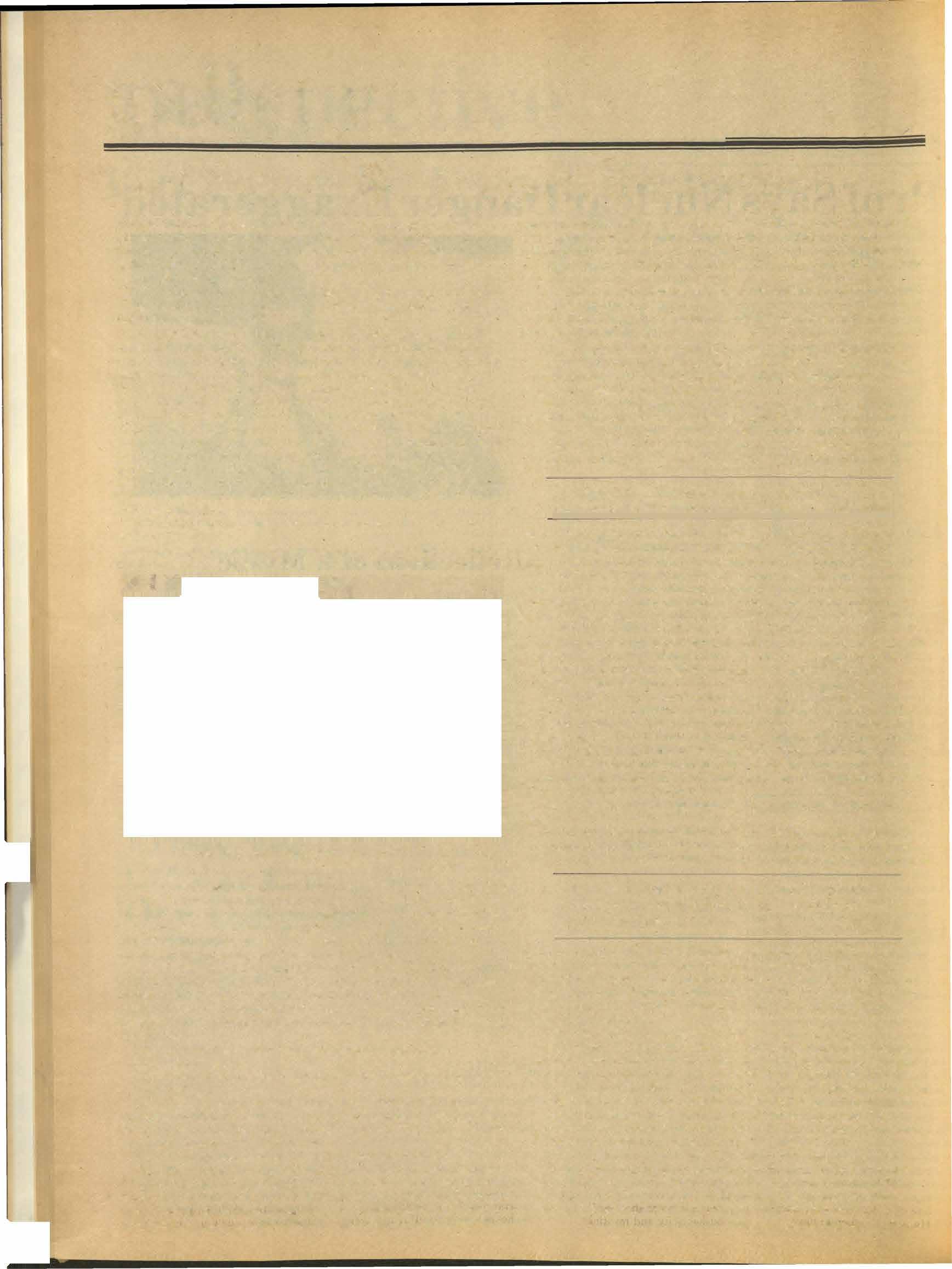
By Lynn Kirch
An -empty pitch-dark theatre at three in the morning, legs like noodles, sweaty palms and chattering teeth are but only a Jew things that a chicken, like myself, must experience in order to proi•e or disprot>e stories and rumors surrounding one of Otterbein 's most mystical legends. The college has many, but only Je1c are as e.rciting and tlwught-prol'oking as the legend of T1cila.
Since Cowan Hall opened its doors in 1951 and presented the produc tion of "The Miser" upon its stage, many events have taken place that have shaped the- theatre's personality. Ghosts such as those portrayed in "Hamlet" and " Blythe Spirit" have appeared magically on stage amongst the theatrical effects of rolling fog and eerie lighting.
The frightening character of Count Dracula has made audiences shutter in their seats as he wiped blood from his chin. Peter Pan soared across the stage, fascinating the young and young-a t-heart, and an entire Scottish village of make-believe was created for the stage.
But something which by far out-does the muslin and paint, the lavish costumes and the fine dramatic presentations, are the amazingly frightening antics and pranks of Twila, Otterbein's longest-running actress.
For many years students have been astounded by the unbelievable stories of falling objects, misplaced props and tools, visions of appar;itions climbing the curtains, moans, groans, screeches and screamsall reportedly linked to a struggling young actress who hung herself from a grid 65 feet above the stage. (Or did she jump?)
Twila, in one story, was a young actress who, like most other young theatre students, was struggling to find her identity and was distraught by the minor roles she had been cast in. Taking her life by tying a rope around her neck and jumping from the grid seemed to be the only answer. This was said to have happened before Fred Thayer, (Pop) assistant professor of theatre, came to Otterbein
Another story places Twila in one of Pop's stagecraft classes. He was supposed to have
flunked her on an exam, thus giving her reason to commit suicide by jumping off the grid and falling to the floor.
Either story that you believe has room for Twila to be a powerful spirit who today is jealous of the young student actresses attempting to achieve the success she could not.
The capers associated with the traditional folklore of Twila are as odd and unbinding to the truth as the absurd stories that once flourished about the ghost in Lambert Hall. And it's true that many respectable theatres boast of their own personal spirit. Professors in the Department of Speech and Theatre simply respond to the stories with a grain of salt and are amused by the interest shown in her by their students. But for some students the tone of the legend is different.
Imagine sitting alone on the stage and having a 30-pound light crash to the stage from the grid above; or imagine being iri. an empty room and hearing your name summoned by a female voice.
Imagine that after locking the door to the tool room, below the stage, you hear a thump against the door. You unlock the door and find a hammer at your feet that just a moment ago hung on the wall across the room.
Imagine standing on stage and being the only one to see the form of a human staring at you from the balcony or imagine glancing towards stage left and catching a glimpse of that same human form.
Imagine being awakened ori a hot summer night by female moans and cries being emitted from the theatre across the street. Imagine these thingsand you too will be captured by the legend of Twila.
There are possible answers for these odd happenings. Maybe too much to drink at the Garden Inn; or the pressures of a show a week behind schedule; or a sleepless night. The phen9mena are insoluble.
Maybe these strange happenings are only coincidences. Have the rumors and stories been created in the imaginative young minds of theatre students? Have they been generated intentionally, thus adding to the air of authenticity and mystical
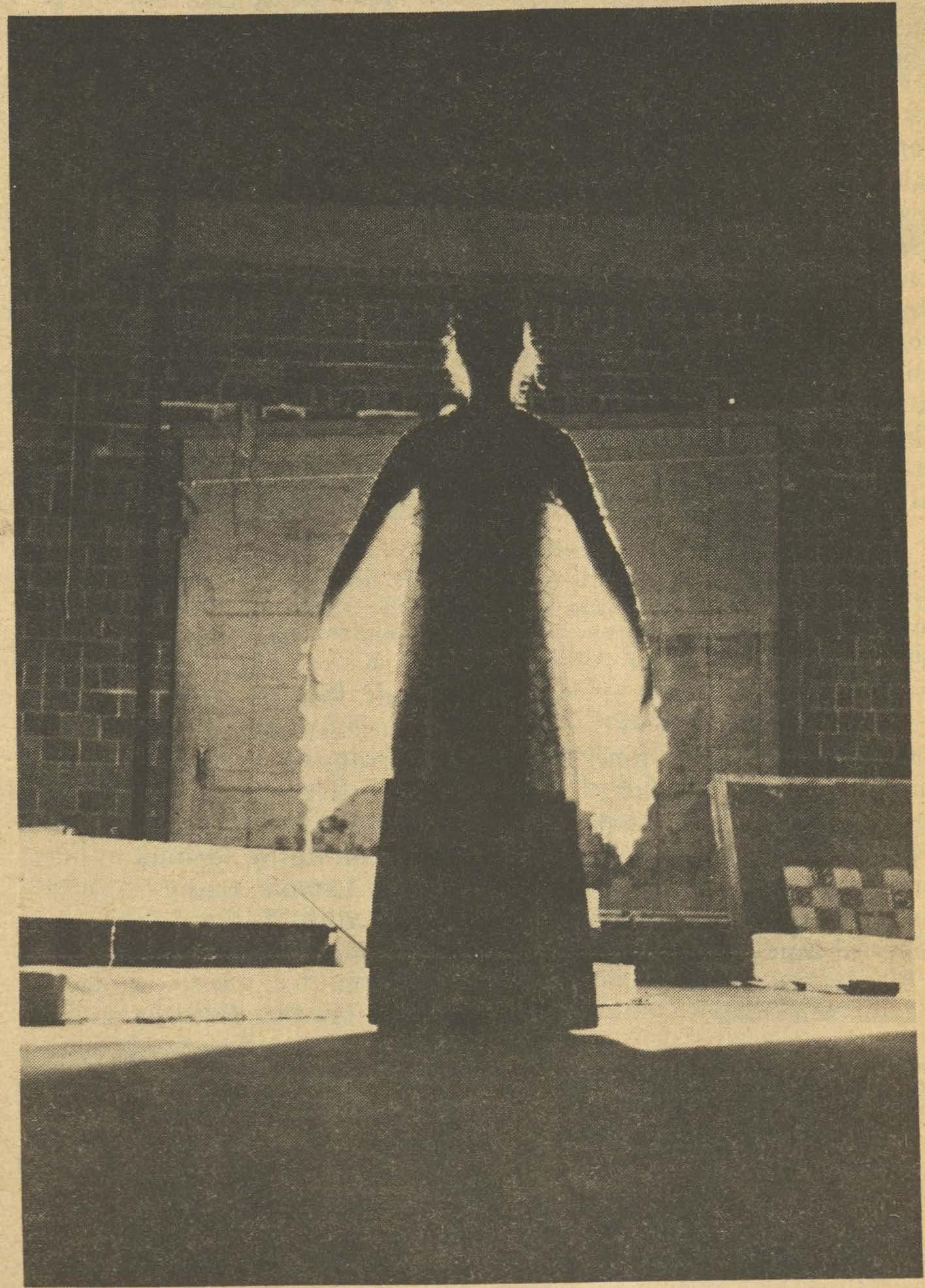
history of the theatre? Or are the stories true? Could there act_ually be a spirit of a distressed young woman inhabiting Cowan Hall?
The legitimacy of the stories can be disappointing to those who are strong beli�vers in the supernatural. There have been no registered deaths happening in Cowan Hall that in any way correspond with the mythical life of Twila. Pop Thayer can not remember flunking a female by the name of Twila in one of his stagecraft classes. James Grissinger, chairman of the Department of Speech and Theatre (who has been a member of Otterbein's community ever since Cowan was built), refuses to believe the legend.
Even Otterbein's foremost authority on history, Harold Hancock, chuckles when he hears the stories. But still there

are some theatre students who believe something or someone connected with.the supernatural inhabits the theatre.
Students must be content in knowing that there truly have been some unexplainable events which have happened in Cowan Hall and that there have been students who have had terrifying experiences there. Is it truth or imagination? I will leave it up to the student to decide.
Whether you believe Twila to be real or mythical, she is still an actress who needs no fog machine or trap door to hide her exits; she needs no brown make-up or green lights to give her a ghostly appearance: and she needs no wires to enable her to fly over her 100-seat playground. We do all of that for her in our own minds.
Opus Zero literally means "no work," but it is obvious that Otterbein College's dynamic show choir, Opus Zero, follows a different philosophy. Excellent vocals, precision choreography, and great instrumentation combine to demonstrate the amount of work involved.
Opus Zero will perform -tomorrow at 8:15 p.m. and Sunday at 3 p.m. in the Battelle Fine Arts Center Auditorium.
The twelve-member singing group rehearses songs ranging from Broadway tunes to country hits. and from jazz to rock-androll. This may make things hectic in rehearsals, but according to senior baritone Larry Brown, "It gives our show the variety to keep everyone in the audience entertained. Besides, it's fun."
Cheryl Nauman, director of the group, stated that the only real problem she has encountered in her first year as director is the difficulty finding a rehearsal time that fits in with 12 singers' and five musicians' schedules.
Admission is $1.25 and tickets are available from 1-4:30 p.m. today in the Battelle Fine Arts Center Office.
Lisa (Rosenbaum) Robinson, a music education major, will be presenting her senior voice recital tonight at 8:15 p.m. in the Battelle Fine Arts Center Auditorium. Wes Nutter, a freshman piano major, will be the accompanist.
A special feature of the onehour program will be a contemporary piece entitled "Dover Beach." A string quartet, comprised of Diana Van Camp, instructor of music at Otterbein, and senior Susan Ott on violin, Meg Million on viola, and Sybil Baker on cello, will accompany this piece.
Admission is free and open to the public.
Two Otterbein honoraries inducted new members into their ranks in the past two weeks.
Alpha Lambda Delta, a freshman women's honorary, inducted 34 new members into the chapter last evening at the Church of the Master. To qualify for membership a student must achieve a 3.5 grade point average or better during her freshman year while carrying an average load.
Following the initiation ceremony, a special dinner was served in conjunction with the 20th anniversary of the chapter. Harold Hancock, professor of history was the guest speaker.
The following freshmen were inducted: Carol Barnes, Yvette Bolla, Sharon Brosnahan, Linda Brown, Kim Collier, Denise Dankhoff, Roberta DeLavo, Cathleen Ferguson, Pamela Gorsuch, Joy Grandstaff.
Laurie Griley, Heidi Guttermuth, Julie Hupp, Janet Hutzelman, Kathy Jenkins, Charlotte Latvala, Cathy Mabry, Judith MacLeod, Deborah Martin, Lisa Meacci, Robin Mele.
Regina Munsey, Cathryn O'Neill, Lorraine Rea, Linda Robinson, Sandra Saltsman, Jolene Schlichting, Paula Simpson, Kathryn Spence, Lisa Trochelman, Tamara Valkosky, Heidi Veach, Valerie Ware, Rebecca Wilds.
Forty-nine students were inducted into Torch and Key (The Otterbein Scholars) during ceremonies at the Church of the Messiah on May 8. The seniors inducted were Karen Horn, Suzanne Kramer, Susan Stanley and Mareha Waddell.
Juniors inducted included Matthew Barnett, Lisa Bowers, Jill Britton, Scott Carroll, Elaine Clinger, Michael Cochran, Daniel Detrich, Rebecca Fickel, Kimberly Fippin, Derrie Folk, Fontaine Follansbee. Anita Galko. Jeffrey Groseclose, Janice Harrell, Tami Hassler, Amy Heininger, Curtis Hodapp, Jeanine Howe, Vi Huffman, Cindy Jackson, Susan James, Shirley Lang, Kris Lehman, Leslie Olmstead.
Rosida Porter, Cynthia Prochaska, Julie Roush, Micha�l Sheehy, Tamara Shepherd, Nancy Sherk, Laurie Strang, Scott Taylor, Jeffrey Timmons, Paul Toskin, Diane Townley, Jeffrey Ulery, Karen Woods. Sophomores inducted were Amy Burkholder, Melanie Butera and Thomas Butera. ADP students inducted were Pamela Cheek, Linda Dorsten, Vivian Hill, Ruth Noble, Nancy Pierce.
Also elected were- J. Patrick Lewis, assistant professor of economics, and Carl M. Becker, alumnus and guest speaker.
Otterbein's Women's Chamber Singers will perform Wednesday at 8:15 p.m. in the Battelle Fine Arts Center. The performance, directed by Lynn Hurstad, will feature chamber music.
The Women's Chamber Singers will sing a selection from Johann Sebastian Bach's Cantata No. 78 and Four Sacred Songs for the Night by Houston Bright. Other selections include "A Girl's Garden," by Randall Thompson, "The Nightingale," by Thomas Weelkes and "May Day Carol," by Deems Taylor.
The concert is free to the general public.

Handicapped individual in Westerville area wants part time help in the evenings. House cleaning and other household duties. 15-20 hours per week. $3.50$4.00 per hour dependent on ability. Call 268-7990 days or 890-3225 evenings.
Daytime babysitter wanted. Full or part time. Autumn Woods area. Call Linda Brownstein 457-8600 ext. 366 days, or 882-6493 evenings.
Rooms for rent-female. Completely furnished. Private phone and cable T.V. hook-ups available. Kitchen and laundry facilities. Private entrance. Call 882-0763.
Needed: two small residence hall refrigerators. Call 890-:3000. ext.
107.
Senior Sue Eastham (flute) and junior Vi Huffman (oboe) will present a joint recital Sunday at 8:15 p.m. in the Battelle Fine Arts Center Auditorium.
The two will present works by Blavet, Hindemith and Telemann. They will be accompanied by Linda Jones on piano and Edwina Hopkins on piano and harpsichord, and will be assisted by Erich Stein on bassoon.
A reception sponsored by Delta Omicron, the ,.,·omen's music honorary, will follow. The recital is free and open to the public.



Continued from page 4
something totally different, provided me with analogies which were very helpful to my work ...Then, there are many poets who have been models for me in one way or another during my life and who have helped me out here and there-old poets and new ones Many of my contemporaries have helped me out, and I think I've helped them, both in the practical way of actually helping to revise each other's work, and also as a stimulus to creative ambition, seeing th� leap that someone has made towards a greater inclusiveness, a greater seriousness, and being challenged by that in a competitive, but not a murderous, way to buckle down and get to it yourself.We challenge each other a lot in a good way but it is certainly competitive.
T&C: It is acompetitivefield, isn't it?
Hall: Un-huh. When you're trying for excellence, when you're really ambitious, there's always a great element of competitiveness.It can be the kind of thing-and I've seen it-it can be a kind of jealousy and

May 16, 1980 Page 7
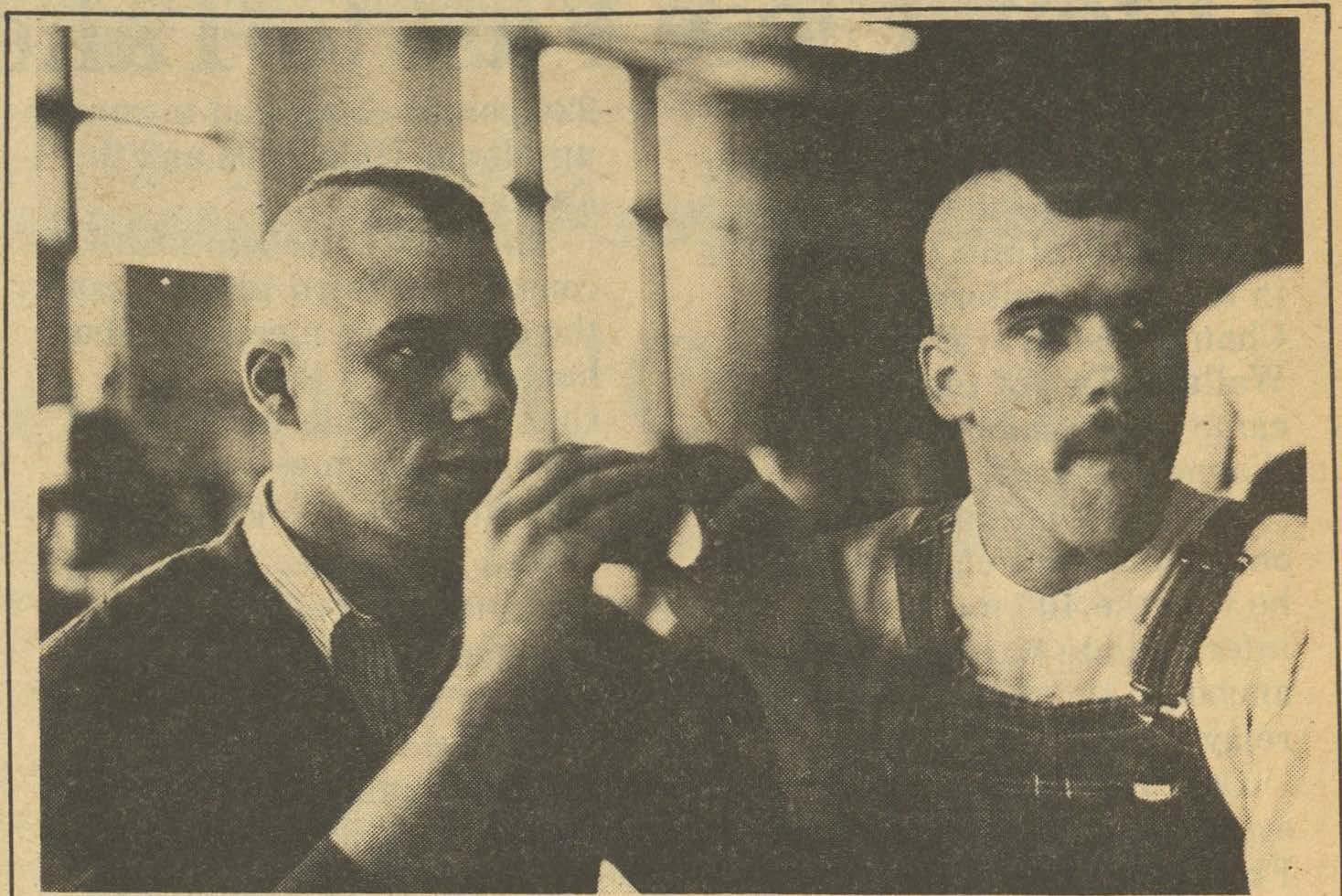
-D. Hall
". . . Icouldneversayhonestlythatthere'sanypoemin my book Ipromise never to change."
bitterness that can tear up a person.I've seen poets get angry about their reputations of others, that they can't think about anything else.I'm simply saying there's competitiveness good and competitive bad.
T&C: Yousaidlastnightthat apoembegins with a phrase orimage. Where doesit end?·
Hall: A poem is unending Although Kicking the Leaves came out just two years ago, I am continually changing the poems printed in there.When I print these poems again, they'll be altered.But that's not the only answer to your question.At some point, obviously, I think they're finished enough to be published.Sometimes, as I read a poem aloud during a reading, I'll begin to improvise Then afterwards I'll write down how I changed it and see if it looks good Then I'll print it in a magazine.When it comes out in a magazine, I may not have seen ·it for six months or a year and I'll have a fresh look at it.I may see something I want to change.Almost everything published in a book is a little different than how it appeared in a magazine.
"But the end of a poem is finally something that is a psychological ethic-it educatesfeelings, makes us more sensitive andaware of ourselves and other people."
-D. Hall
T&C: So a poemneverreachesafinishedor static state?
Hall: Sometimes it will stay still for ten years, then I'll see something I want to change.So no, not finished-maybe relatively still-but I could never say honestly that there's any poem in my book I promise to never change.
T&C: Why doyouthinka personinour society shouldreadpoetry?
Hall: I wish everybody could read poetry.It's an enormous pleasure and it's a life-enhancing pleasure.It's a pleasure which is illuminative of each person's self.That is, I read poetry and love it, am moved by it, am changed by it.I think that the great poems change our perceptions, open us up to greater understandings.I think they do it partly by being beautiful.That's their source of energy and power.But the end of a poem is finally something that Is a psychological ethic-it educates feelings, makes us more sensitive and aware of ourselves and other people.You can not be aware of other people's feelings without being aware of your own.

These twomen are wanted by,14 federal agencies and are rumoredto be hiding outat Otterbeindisguised as members of a religious cult. Approach withcaution andtaste. Boehm photo
When I asked him how he felt about his parents he said: "I Continuedfrom page 2 Alexandr told me a story shoot first, ask question later." about his work for Stalin.One time Stalin, the man with the mustache, was invited to one of the best brothels in Moscow.It was on condition, though.The woman there said that she would give him the best night of his life if he were to come alone.
Stalin, fearing that there would be some attempt on his life, asked for Alexandr's help as a master of disguise. Alexandr, a week before Stalin's visit dressed as a "lady of the evening and got a job at the brothel.
Most recently he has held a position with the KGB, but his position is not available to American sources.Alexandr is six-foot five inches and jogs fifteen miles a day.He defected from the USSR last year because his wife could not stand him wearing sunglasses to bed. She tried to expose his abnormal sex life to the KGB so he would loose his job, but Alexandr left the country.
When I asked him how he would enforce the policies at Otterbein College he said: "I shoot first, ask question later."
When I asked him how he felt about American students he answered: "I shoot first, ask question later."
Alexandr was hired at Otterbein because of his affiliation with the Russian KGB.Otterb�in felt they needed a person accustomed to surveillance techniques.They wanted someone who could find out what was really going on in the different organizations on campus.
During that week he uncovered one young lady with evil intents about Stalin.He sl aughtered her the evening of Stalin's arrival and allowed Stalin to have the "best night of his life." Even Stalin said it was the best night.
I asked Alexandr to tell me how he managed to keep his sex hidden even after entertaining fifty men.He said that a magician never discloses his secrets; but he did add that all fifty left with smiles on their faces.
With all these new improvements we can be assured that our short stay at Otterbein will be a safe one. Never again will we attempt to take the security cops for granted.If we do we might find ourselves at the bottom of the heating tunnels underneath the campus. Peace.
By Craig Merz
Sparked by some outstanding individual efforts Otterbein managed to climb to third place in· the Ohio Conference Championship at BaldwinWallace. Two of the best efforts came from junior co-captains Wayne Woodruff and Bob Gold.
Woodruff became Otterbein's only conference champion when he won the 400 meter intermediate hurdles. He also anchored the second-place mile relay team.
Gold ran three grueling events-the 10,000 meter run on Friday and the 1500 and 5000 Saturday-and placed in the 10,000 -and 5000.
The meet was won by an awesor:1e B-W squad. The Yellow Jackets racked up an amazing
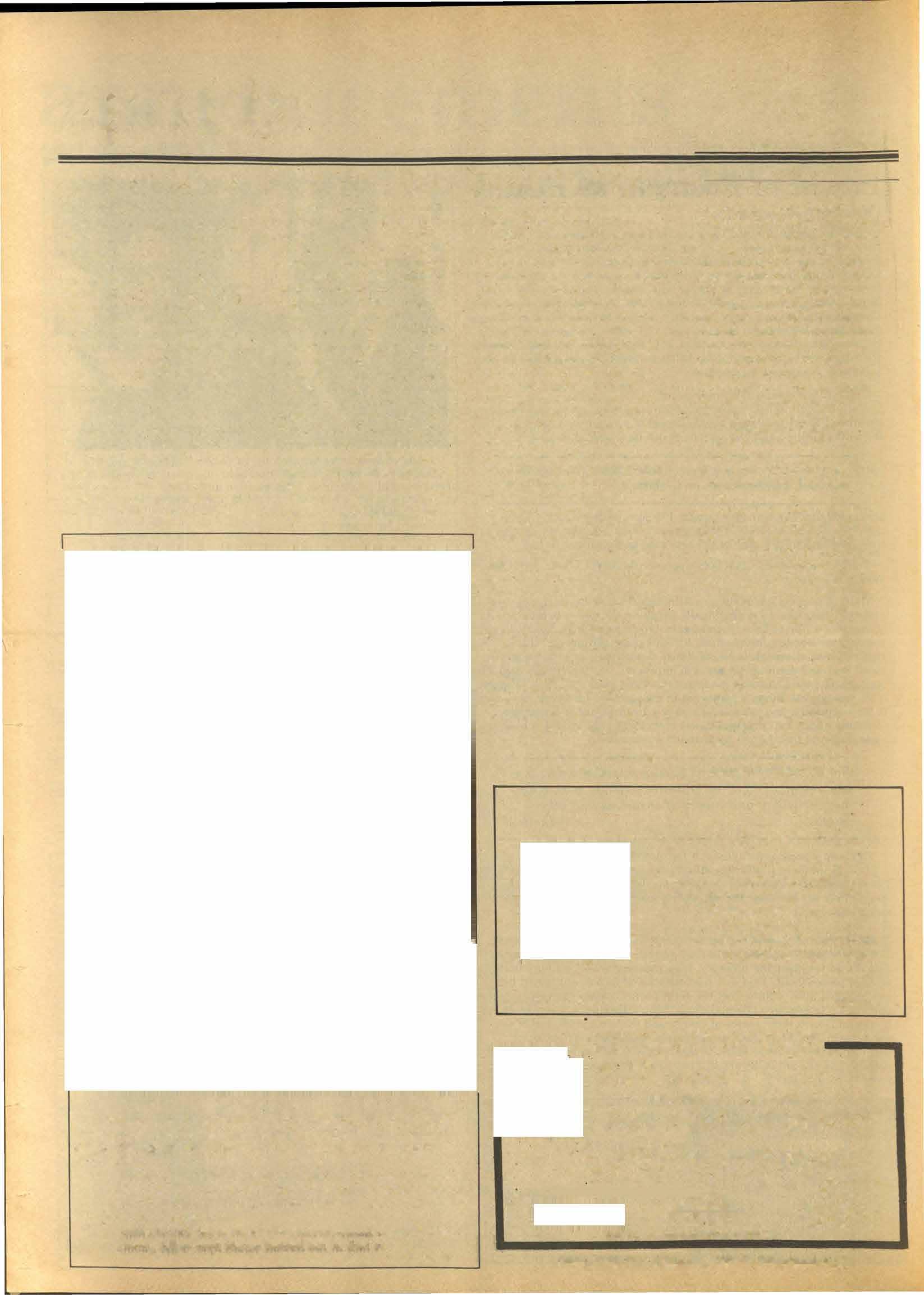
224 points, compared to runnerup Mount Union's 94 and the Cards' 71.
This was Otterbein's fifth consecutive third-place finish in the conference meet. Otterbein has never won the championship in the 77-year history of the meet; nor have they finished as high as second.
Woodruff proved why he is a two-time All-American as he defeated a strong field in the hurdles. The top four finishers were all under the Division III national qualifying time, but "Woody" outran them all. His winning time of 53.5 seconds was three-tenths of a second ahead of Dennis Hearns of Ohio Wesleyan.
Woodruff was not through, however. Going into the last
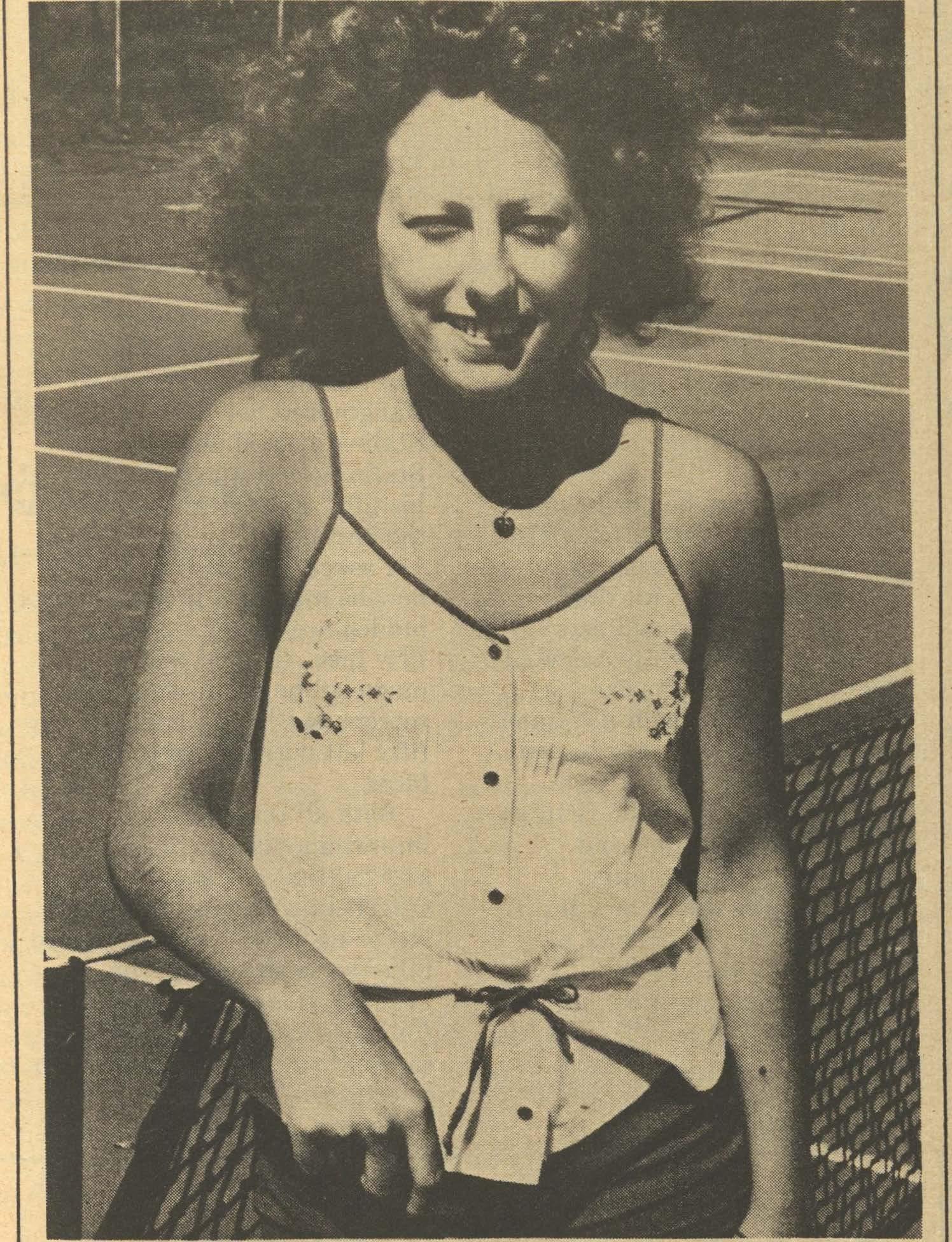
Freshman Lou Slater will be competing this weekend in the Midwest Association for Intercollegiate Athletics for Women (MAIAW) tennis tournament at the University of WisconsinWhitewater.
event, the 1600 meter relay, Otterbein needed to finish ahead of Wesleyan to wrap up third place in the meet. Woodruff took the handoff from hard-charging sophomore John McKenzie and ran the Cards to a second-place finish in 3:19.3.
The relay team of freshman· Dan Rader, freshman Tim Bland, McKenzie and Woodruff chopped five seconds off the team's previous best time this year. They missed by fourtenths of a second from qualifying for the nationals.
Otterbein would not have had the chance for third if it was not for the points it scored in the 5000 meter run. The Cards scored 16 points while the teams ahead of Otterbein in the standings at that time, Wesleyan and Ohio Northern, scored a total of one point.
A pair of sophomores, Rob Rose and Jeff Kneice, took second and third respectively. Rose ran a 15:12, while Kneice was ten seconds behind. Gold finished fifth in 15:31 to complete a busy meet for him.
First, Gold finished third in the 10,000 with a time of 31:27, which was 12 seconds away from the national's standard. He came back to run in the 1500, and then used a last-lap spurt to pick up badly needed points in the 5000.
The only school record was set in the 3000 meter

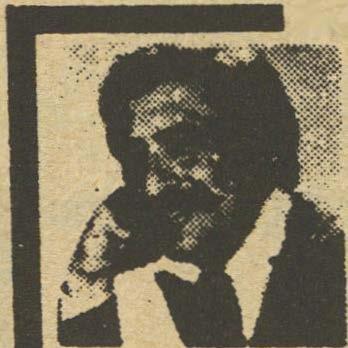

steeplechase by sophomore Hal Hopkins. He finished third, just a little over two seconds off the national qualifying time. Hopkins' 9:25.9 broke the old school record of 9:28 set earlier this year by Rick Miller. There weFe three other thirdplace finishers. Senior Chuck Amstutz went 44'5" on his last attempt to get third in the triple jump. The 400 meter relay team of Rader, senior Tim Pitt, Woodruff and sophomore Kevin Brown finished third with its best time of the year.
Freshman Mark Burns squeezed into third with a blistering 3:55.4 in the 1500 meter run. His time is less than a half-second off the school record.
Senior Kyle Yoest placed fourth in the pole vault with a best effort of 14'. Sophomore Steve Conley wound up sixth in the discus with a throw of 143'1". In the 110 meter high hurdles, sophomore Dan Deleon, closing in on the nationals, finished fifth with a time of 15.2
MAKING TRAX: The breakdown of top six confere nee finishers by class-seniors,3; juniors, 4; sophomores, 6; freshman, 2 Last year when Otterbein took third with 102 points they had four conference champions.